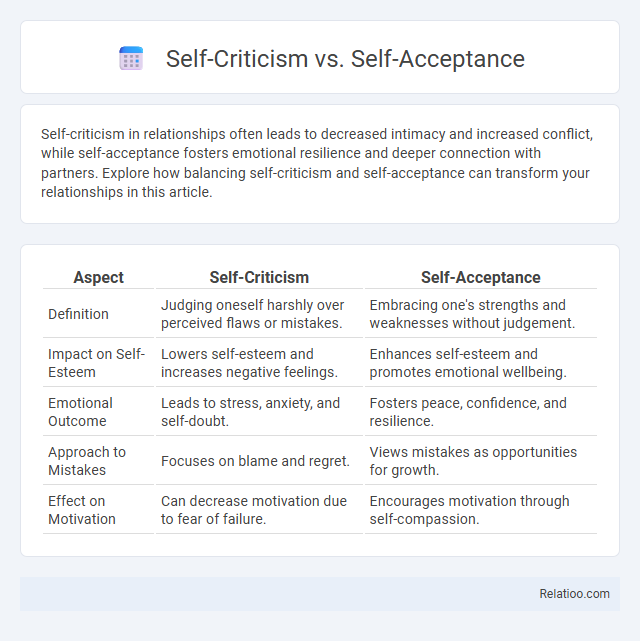Self-criticism in relationships often leads to decreased intimacy and increased conflict, while self-acceptance fosters emotional resilience and deeper connection with partners. Explore how balancing self-criticism and self-acceptance can transform your relationships in this article.
Table of Comparison
| Aspect | Self-Criticism | Self-Acceptance |
|---|---|---|
| Definition | Judging oneself harshly over perceived flaws or mistakes. | Embracing one's strengths and weaknesses without judgement. |
| Impact on Self-Esteem | Lowers self-esteem and increases negative feelings. | Enhances self-esteem and promotes emotional wellbeing. |
| Emotional Outcome | Leads to stress, anxiety, and self-doubt. | Fosters peace, confidence, and resilience. |
| Approach to Mistakes | Focuses on blame and regret. | Views mistakes as opportunities for growth. |
| Effect on Motivation | Can decrease motivation due to fear of failure. | Encourages motivation through self-compassion. |
Understanding Self-Criticism: Definition and Origins
Self-criticism involves evaluating your actions and traits with a negative bias, often rooted in early childhood experiences and cultural influences. Understanding self-criticism requires exploring how internalized standards and fears of failure shape this harsh inner dialogue. Recognizing these origins can help you transform self-criticism into a balanced perspective that fosters growth rather than diminishing self-worth.
What Is Self-Acceptance? Key Concepts Explained
Self-acceptance involves recognizing and embracing your strengths and weaknesses without harsh judgment, fostering emotional resilience and mental well-being. Unlike self-criticism, which emphasizes flaws and mistakes, self-acceptance promotes a balanced self-view, reducing negative self-talk and increasing self-compassion. Understanding these key concepts helps you cultivate a healthier relationship with yourself, improving overall psychological health.
Psychological Effects of Self-Criticism
Self-criticism often leads to increased stress, anxiety, and lowered self-esteem, impairing mental health and overall well-being. Unlike self-acceptance, which fosters resilience and positive self-regard, excessive self-criticism can hinder your ability to cope with challenges and maintain motivation. Managing self-critical thoughts is crucial for promoting psychological balance and emotional stability.
Benefits of Practicing Self-Acceptance
Practicing self-acceptance fosters emotional resilience and improves mental health by reducing the negative impacts of harsh self-criticism. Your ability to embrace personal flaws and strengths enhances overall well-being and encourages authentic growth. Unlike self-criticism, self-acceptance promotes a balanced mindset that supports long-term motivation and self-compassion.
Self-Criticism vs Self-Acceptance: Core Differences
Self-criticism involves harsh judgment and negative self-evaluation that can undermine mental well-being and self-esteem, whereas self-acceptance emphasizes embracing flaws and strengths without judgment, fostering emotional resilience and personal growth. Core differences lie in how these attitudes impact psychological health: self-criticism often leads to stress and anxiety, while self-acceptance promotes inner peace and motivation. Research in positive psychology highlights that cultivating self-acceptance reduces depressive symptoms and enhances overall life satisfaction compared to persistent self-criticism.
How Self-Talk Influences Wellbeing
Self-talk significantly shapes your psychological wellbeing by influencing self-criticism and self-acceptance patterns. Negative self-talk intensifies self-criticism, leading to increased stress, anxiety, and lower self-esteem, whereas positive self-talk fosters self-acceptance, promoting resilience and emotional balance. Cultivating empowering self-talk helps you strengthen your mental health and enhances overall life satisfaction.
Common Triggers for Self-Criticism
Common triggers for self-criticism often include perceived failures, unmet personal standards, and negative feedback from others. These triggers activate harsh internal dialogue, undermining self-esteem and increasing stress levels. Developing self-acceptance involves recognizing these triggers and responding with compassion rather than judgment, which promotes emotional resilience and mental well-being.
Strategies to Cultivate Self-Acceptance
Cultivating self-acceptance involves practicing mindfulness to observe your thoughts without judgment and reframing negative self-talk into constructive insights. Engaging in self-compassion exercises helps combat self-criticism by encouraging kindness towards your own imperfections, fostering emotional resilience. Setting realistic goals and celebrating small achievements can gradually shift your mindset from harsh self-criticism to a balanced self-acceptance, enhancing overall well-being.
Overcoming Obstacles on the Path to Self-Acceptance
Overcoming obstacles on the path to self-acceptance requires recognizing the detrimental impact of harsh self-criticism, which often undermines confidence and impedes personal growth. Embracing self-acceptance fosters resilience by encouraging a compassionate inner dialogue, enabling individuals to confront challenges without fear of judgment. Cultivating this mindset transforms setbacks into opportunities for learning, ultimately strengthening emotional well-being and self-esteem.
Creating a Balanced Approach: Self-Reflection Without Self-Judgment
Self-criticism can hinder personal growth by fostering negative self-judgment, whereas self-acceptance promotes mental well-being through embracing imperfections. Creating a balanced approach involves practicing mindful self-reflection that encourages awareness without harsh evaluation. Integrating techniques like compassionate self-talk and cognitive restructuring facilitates growth while maintaining emotional resilience.

Infographic: Self-criticism vs Self-acceptance
 relatioo.com
relatioo.com